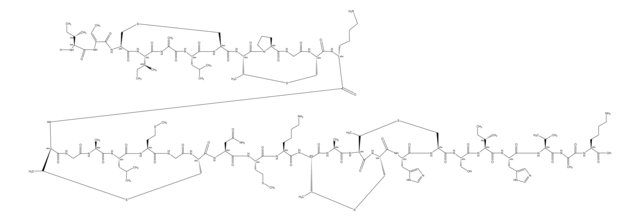B0125
Bacitracin
from Bacillus licheniformis, ≥65 IU/mg
Synonym(s):
Altracin, Bacitracin A
About This Item
Recommended Products
biological source
Bacillus licheniformis
Quality Level
form
powder
specific activity
≥65 IU/mg
antibiotic activity spectrum
Gram-positive bacteria
Mode of action
cell wall synthesis | interferes
storage temp.
2-8°C
SMILES string
[H]N1[C@@H](Cc2cnc[nH]2)C(=O)N[C@H](CC(O)=O)C(=O)N[C@@H](CC(N)=O)C(=O)NCCCC[C@H](NC(=O)[C@@H](NC(=O)[C@@H](CCC(O)=O)NC(=O)[C@H](CC(C)C)NC(=O)C3CSC(=N3)C(N)C(C)CC)[C@@H](C)CC)C(=O)N[C@H](CCCN)C(=O)N[C@@H]([C@@H](C)CC)C(=O)N[C@H](Cc4ccccc4)C1=O
InChI
1S/C66H103N17O16S/c1-9-35(6)52(69)66-81-48(32-100-66)63(97)76-43(26-34(4)5)59(93)74-42(22-23-50(85)86)58(92)83-53(36(7)10-2)64(98)75-40-20-15-16-25-71-55(89)46(29-49(68)84)78-62(96)47(30-51(87)88)79-61(95)45(28-39-31-70-33-72-39)77-60(94)44(27-38-18-13-12-14-19-38)80-65(99)54(37(8)11-3)82-57(91)41(21-17-24-67)73-56(40)90/h12-14,18-19,31,33-37,40-48,52-54H,9-11,15-17,20-30,32,67,69H2,1-8H3,(H2,68,84)(H,70,72)(H,71,89)(H,73,90)(H,74,93)(H,75,98)(H,76,97)(H,77,94)(H,78,96)(H,79,95)(H,80,99)(H,82,91)(H,83,92)(H,85,86)(H,87,88)/t35?,36-,37-,40-,41+,42+,43-,44+,45-,46-,47+,48?,52?,53-,54-/m0/s1
InChI key
CLKOFPXJLQSYAH-RNHDWVCBSA-N
Looking for similar products? Visit Product Comparison Guide
Related Categories
General description
Application
Biochem/physiol Actions
Antimicrobial spectrum: Gram-positive bacteria.
Mode of Action: Inhibits bacterial cell wall synthesis by inhibiting dephosphorylation of lipid pyrophosphate.
Other Notes
Storage Class Code
11 - Combustible Solids
WGK
WGK 2
Flash Point(F)
Not applicable
Flash Point(C)
Not applicable
Personal Protective Equipment
Certificates of Analysis (COA)
Search for Certificates of Analysis (COA) by entering the products Lot/Batch Number. Lot and Batch Numbers can be found on a product’s label following the words ‘Lot’ or ‘Batch’.
Already Own This Product?
Find documentation for the products that you have recently purchased in the Document Library.
Customers Also Viewed
Our team of scientists has experience in all areas of research including Life Science, Material Science, Chemical Synthesis, Chromatography, Analytical and many others.
Contact Technical Service










